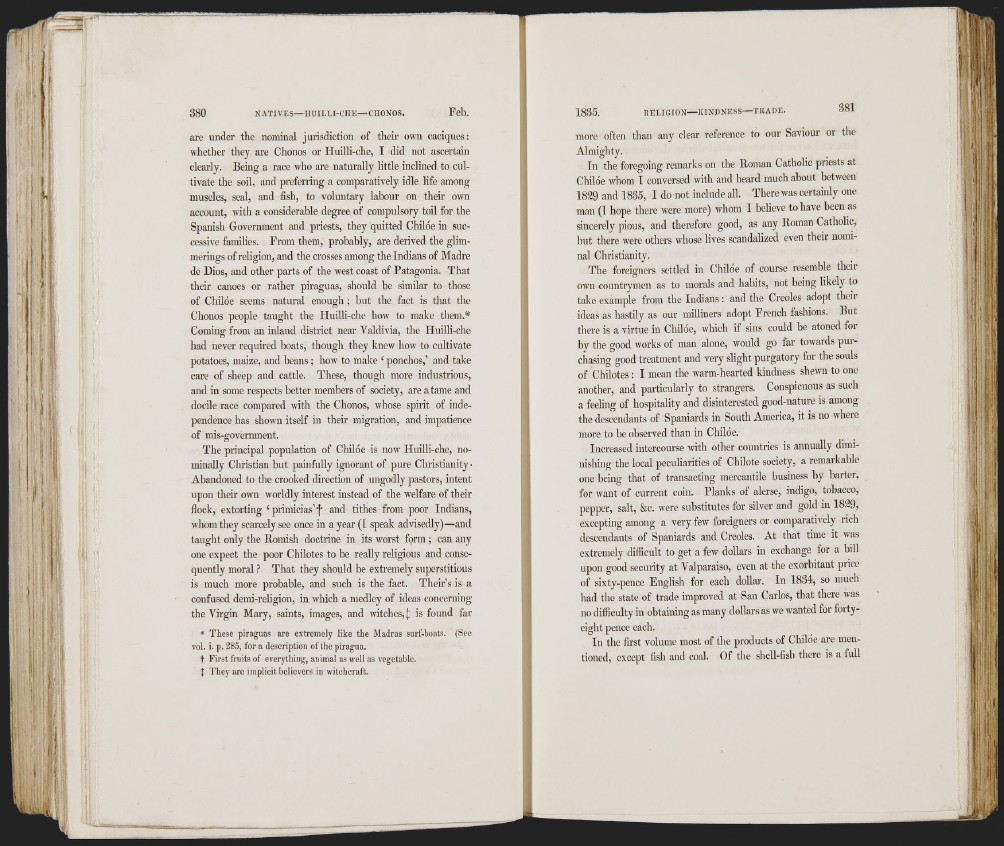
0 '»f'l
380 Feb.
are under the nominal jurisdiction of their own caciques:
whether they are Chonos or Huilli-che, I did not ascertain
clearly. Being a race who axe naturally little inclined to cultivate
the soil, and preferring a comparatively idle life among
muscles, seal, and fish, to voluntary labour on their own
account, with a considerable degree of compulsory toil for the
Spanish Government and priests, they quitted Chiloe in successive
families. From them, probably, are derived the glimmerings
of religion, and the crosses among the Indians of Madre
de Dios, and other parts of the west coast of Patagonia. That
their canoes or rather piraguas, should be similar to those
of Chiloe seems natural enough ; but the fact is that the
Chonos people taught the Huilli-che how to make them.*
Coming from an inland district near Valdivia, the Huilli-che
had never required hoats, though they knew how to cultivate
potatoes, maize, and beans ; how to make ‘ ponchos,’ and take
care of sheep and cattle. These, though more industrious,
and in some respects better members of society, are a tame and
docile race compared with the Chonos, whose spirit of independence
has shown itself in their migration, and impatience
of mis-government.
The principal population of Chilóe is now Huilli-che, nominally
Christian but painfully ignorant of pure Christianity-
Abandoned to the crooked direction of ungodly pastors, intent
upon their own worldly interest instead of the welfare of their
fiock, extorting ‘ primicias’! and tithes from poor Indians,
whom they scarcely see once in a year (I speak advisedly)—and
taught only the Romish doctrine in its worst form ; can any
one expect the poor Chilotes to be really religious and consequently
moral ? That they should be extremely superstitious
is much more probable, and such is the fact. Their’s is a
confused demi-reUgion, in which a medley of ideas concerning
the Virgin Mary, saints, images, and witches,] is found far
* These piraguas are extremely like the Madras surf-boats. (See
vol. i- p. 285, for a description of the piragua.
t First fruits of everything, animal as well as vegetable.
J They are implicit believers in witchcraft.
more often than any clear reference to our Saviour or the
Almighty.
In the foregoing remarks on the Roman Catholic priests at
Chilóe whom I conversed with and heard much about between
1829 and 1836, I do not include all. There was certainly one
man (I hope there were more) whom I believe to have been as
sincerely pious, and therefore good, as any Roman Catholic,
but there were others whose lives scandalized even their nominal
Christianity.
The foreigners settled in Chilóe of course resemble their
own countrymen as to morals and habits, not heing likely to
take example from the Indians: and the Creoles adopt their
ideas as hastily as our milliners adopt French fashions. But
there is a virtue in Chilóe, which if sins could be atoned for
by the good works of man alone, would go far towards purchasing
good treatment and very slight purgatory for the souls
of Chilotes ; I mean the warm-hearted kindness shewn to one
another, and particularly to strangers. Conspicuous as such
a feehng of hospitality and disinterested good-nature is among
the descendants of Spaniards in South America, it is no where
more to be observed than in Chilóe.
Increased intercourse with other countries is annually diminishing
the local peculiarities of Chilote society, a remarkable
one being that of transacting mercantile business by barter,
for want of current coin. Planks of alerse, indigo, tobacco,
pepper, salt, &c. were substitutes for silver and gold in 1829,
excepting among a very few foreigners or comparatively rich
descendants of Spaniards and Creoles. At that time it was
extremely difficult to get a few dollars in exchange for a bill
upon good security at Valparaiso, even at the exorbitant price
of sixty-pence English for each dollar. In 1834, so much
had the state of trade improved at San Carlos, that there was
no difficulty in obtaining as many dollars as we wanted for forty-
eight pence each.
In the first volume most of the products of Chilóe are mentioned,
except fish and coal. Of the shell-fish there is a full
i u .